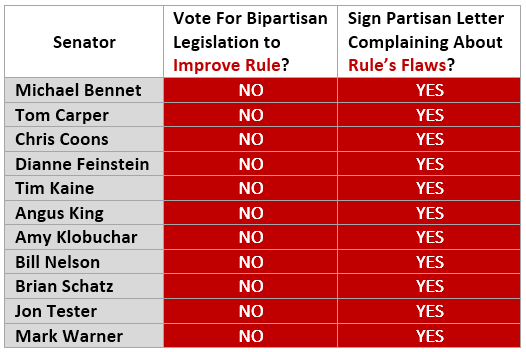Democrats Block Effort to Improve Water Rule
-
The EPA and Army Corps of Engineers issued a rule giving themselves broad new power over water and land across the country.
-
On Tuesday, Democrats filibustered the Senate’s best opportunity to revise the rule in a strong, bipartisan way.
-
Then 11 Democrats sent a letter complaining about the flaws in the rule they just voted to keep in place.
On June 29, the Obama administration published a final rule expanding the definition of “waters of the United States” for purposes of the Clean Water Act. It extends federal jurisdiction to irrigation ditches, isolated ponds, prairie potholes, and other non-navigable waters. The rule is an executive power grab that has more to do with controlling land-use decisions than ensuring access to clean water.
Democrats Reject Bill to Improve Rule, Then Complain about the Rule’s Flaws
This week, Democrats supported the final rule when they filibustered the Federal Water Quality Protection Act. That bill would have directed the Environmental Protection Agency and the Army Corps of Engineers to improve the rule. Then, 11 of those Democrats sent a letter to the EPA and the Corps to complain about the rule.
Democrats against Bipartisan Legislation, For Partisan Letter
The 11 Democrats wrote that the EPA and the Corps “can and must do better to address the legitimate issues that have been raised” about the rule. They reserved “the right to support efforts in the future to revise the rule.” They expressed an interest in “working with [the EPA and the Corps] to sufficiently address the concerns” of their constituents.
These 11 Democrats could have voted to require, rather than merely recommend, that the EPA and the Corps better address legitimate concerns. They could have exerted, rather than merely reserved, a right to revise the rule. They could have worked with Republicans, rather than merely express an interest in working with the Obama administration, to address the concerns of their constituents.
The 11 Democrats could have done all of these things if they had simply voted in favor of allowing the Senate to consider the Federal Water Quality Protection Act. They could have supported improvements to the rule that were painstakingly negotiated by stakeholders from across the political spectrum. They could have modified those improvements or even required additional improvements by offering amendments to the legislation. At the end of the process, they could have then decided whether or not to support passage of the final, amended bill.
By rejecting the legislative process, the 11 Democrats relinquished their most effective tool for effectuating improvements to the rule. By sending the letter, they paid lip-service to their constituents’ concerns and ensured no improvements to the rule will occur.
“In this letter, 11 Democrats agreed that EPA did not provide clarity in its final WOTUS rule to protect American land owners. But instead of voting to debate a bipartisan bill that would have forced EPA to provide that clarity – and offer perfecting amendments if they wished – they wrote a letter.” – Senator Inhofe, 11/4/2015
Senate Democrats Ignore Stakeholders
When finalizing the rule, the Obama administration was insincere in listening to stakeholder concerns – then effectively ignored them. It ignored opposition from families, farmers, ranchers, home builders, state and local governments, small businesses, and other property owners. It even ignored concerns from its own Small Business Administration and Army Corps of Engineers. Last Tuesday, stakeholders were ignored once again – this time by Senate Democrats who voted to block legislation that would have required the administration to issue a revised rule that took their concerns into account.
By blocking the Federal Water Quality Protection Act from consideration on the Senate floor, Democrats guaranteed that uncertainty over the definition of “waters of the U.S.” will remain. They shut out average Americans from the rulemaking process, keeping it squarely under the control of the Obama administration. They deprived the Senate of its best opportunity to achieve the policy outcome that a bipartisan group of Senators support.
Next Article Previous Article

